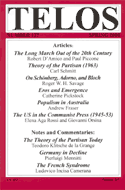We’re pleased to announce that Matthias Küntzel’s Jihad and Jew-Hatred: Islamism, Nazism, and the Roots of 9/11 is now available for purchase as a Kindle eBook. To purchase the eBook, visit the Amazon.com product page or buy it from within your Kindle reader or mobile Kindle app.
|
As an occasional feature on TELOSscope, we highlight a past Telos article whose critical insights continue to illuminate our thinking and challenge our assumptions. Today, Johannes Grow looks at Pierluigi Mennitti’s “Germany in Decline,” from Telos 127 (Spring 2004). Ernst Jünger’s The Adventurous Heart: Figures and Capriccios is now available for the first time in English translation from Telos Press. Maxwell Woods spoke with the book’s translator, Thomas Friese, about the challenges of translating Jünger into English as well as the increasing relevance of the author’s writings to our current social and political landscape. Purchase your copy of The Adventurous Heart here. Thomas Friese: First impressions obviously have special value, and The Adventurous Heart was my first encounter with Jünger. It was an ideal start, since this book is a concise introduction to the worldview of the mature author. Ideally, all new readers would come to Jünger via this book—there are certainly worse ways, which are unfortunately also more common—i.e., through Der Arbeiter or Storms of Steel, or, worse still, through clichéd second-hand opinions. No doubt, there are successful moderate right-wing conservative parties all over Europe. Their names may be different, but they have one thing in common: they grow stronger while forcing government to alter policies and solve problems caused by illegal immigration and tendencies toward more centralization within the European Union. Therefore, it becomes more and more difficult to eliminate public debate about those and other topics. However, there is one big exception: Germany. A party comparable to the Austrian Freedom Party still doesn’t exist there. The five “big players” that are represented in the Bundestag (the national parliament) and in the Landtag (the federal state parliaments) are either left-wing or at the center. One example is the Christian Democratic Union (CDU), which is part of the current government coalition together with the Free Democratic Party (FDP). One may assume that only a small minority of the electorate sympathizes with the agenda of staunchly conservative groups. But surveys conducted last year strongly refute this assumption. Of course, it was Imperial Japan, not Nazi Germany, that attacked Hawaii. Yet in the immediate aftermath of the day of infamy, the United States entered a war both in Europe and in the Pacific. Although the political structures and ideologies of Japan and Germany were hardly identical and their geopolitical ambitions were not at all thoroughly aligned (who would replace the British in India?), President Roosevelt was able to articulate a clear opposition between the democracies and the fascist powers. Differences among the various fascist regimes could still leave room for nuanced policies and strategic decisions: there was no allied invasion of Franco’s Spain. Yet the fact that Mussolini was not Hitler did not prohibit the invasion of Sicily, a crucial link in the chain that would lead to victory in both theaters. Such was the ability of American society then and its political leadership to resist and defeat the dictatorships of the Second World War, followed decades later by the successful conclusion of the Cold War with the collapse of the Soviet Union. That capacity for such political and military resolve is however of a completely different nature than academic inquiry which, characteristically, has developed a rich insight into the specific features and differences among the dictatorships. Scholars distinguish and differentiate, and this variegated knowledge can, at times, inform policy decisions, but, in the end, academics have the professional luxury of never having to act and certainly not to take action to contribute to national security. Some intellectuals nonetheless have the ability to see the big picture. Arendt’s Origins of Totalitarianism of 1951 draws primarily on the examples of Nazi Germany and Stalinist Russia, between which she describes important similarities. Aside from the left, which has always resented the impugning of Communism, academic objections to Arendt’s study have pointed out the undeniable differences between Hitler and Stalin, and their respective regimes. Within scholarly research, such criticisms should not be discounted, but there is a point, particularly when one moves from the university into the political arena, where this quibbling becomes a debilitating fixation: insistence on the specificity of each tree, while refusing to take note of the forest. This is a problem with categories as such. Individual phenomena retain an irreducible particularity, which makes up the texture of lived life, the Lebenswelt; at the same time, we cannot do without a conceptual vocabulary to describe commonalities and to enable action in the world. Action is a defining condition of humanity, the ability to build on reflection to transform the world through creative innovation. Without the conceptual tools of thought, action becomes blind; but without an active pursuit of human goals—telos—thought diminishes. |
||||
|
Telos Press Publishing · PO Box 811 · Candor, NY 13743 · Phone: 212-228-6479 Privacy Policy · Data Protection Copyright © 2025 Telos Press Publishing · All Rights Reserved |
||||
 In “Germany in Decline,” from Telos 127 (Spring 2004), Pierluigi Mennitti addresses Berlin’s inability to enact “true” reforms, which has subsequently led to a decline in its economic, geopolitical, and cultural influence. Through an examination of a contemporaneous Der Spiegel article, Mennitti demonstrates the reluctance of the Federal Republic to accept such thoroughgoing Reformen, which would allow it to crawl out of its then apparent decline and to depend far less on the economic strategies propounded during the so-called “economic miracle” of the post-1949 era. Although it would seem to have been premature to write off Germany as the “economic engine” in Europe, his article nevertheless offers several accurate points. For example, Mennitti asserts that Germany
In “Germany in Decline,” from Telos 127 (Spring 2004), Pierluigi Mennitti addresses Berlin’s inability to enact “true” reforms, which has subsequently led to a decline in its economic, geopolitical, and cultural influence. Through an examination of a contemporaneous Der Spiegel article, Mennitti demonstrates the reluctance of the Federal Republic to accept such thoroughgoing Reformen, which would allow it to crawl out of its then apparent decline and to depend far less on the economic strategies propounded during the so-called “economic miracle” of the post-1949 era. Although it would seem to have been premature to write off Germany as the “economic engine” in Europe, his article nevertheless offers several accurate points. For example, Mennitti asserts that Germany  Maxwell Woods: In your preface to The Adventurous Heart, by Ernst Jünger, you write that “this book hooked me on the author for life.” What is it about this particular book that you found so captivating? Do you find yourself returning to this book in your studies of Jünger? Of Jünger’s work does this book hold a special place for you?
Maxwell Woods: In your preface to The Adventurous Heart, by Ernst Jünger, you write that “this book hooked me on the author for life.” What is it about this particular book that you found so captivating? Do you find yourself returning to this book in your studies of Jünger? Of Jünger’s work does this book hold a special place for you? 

